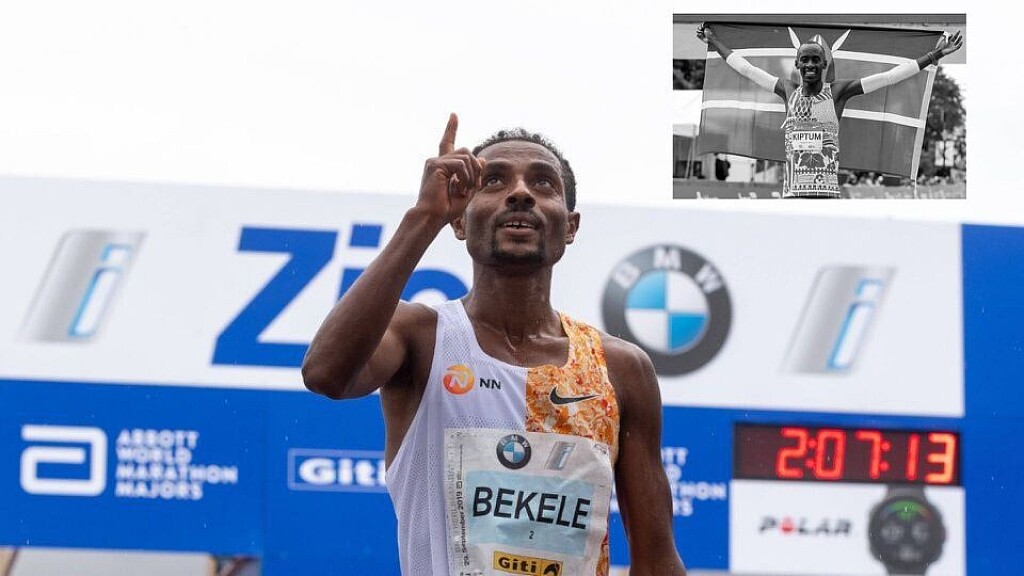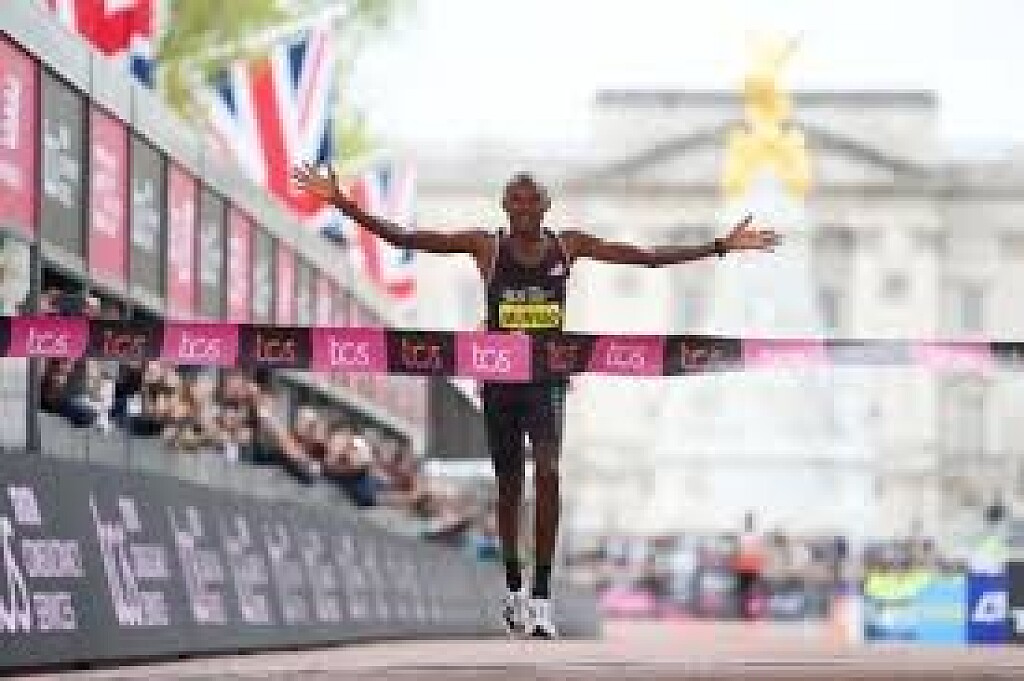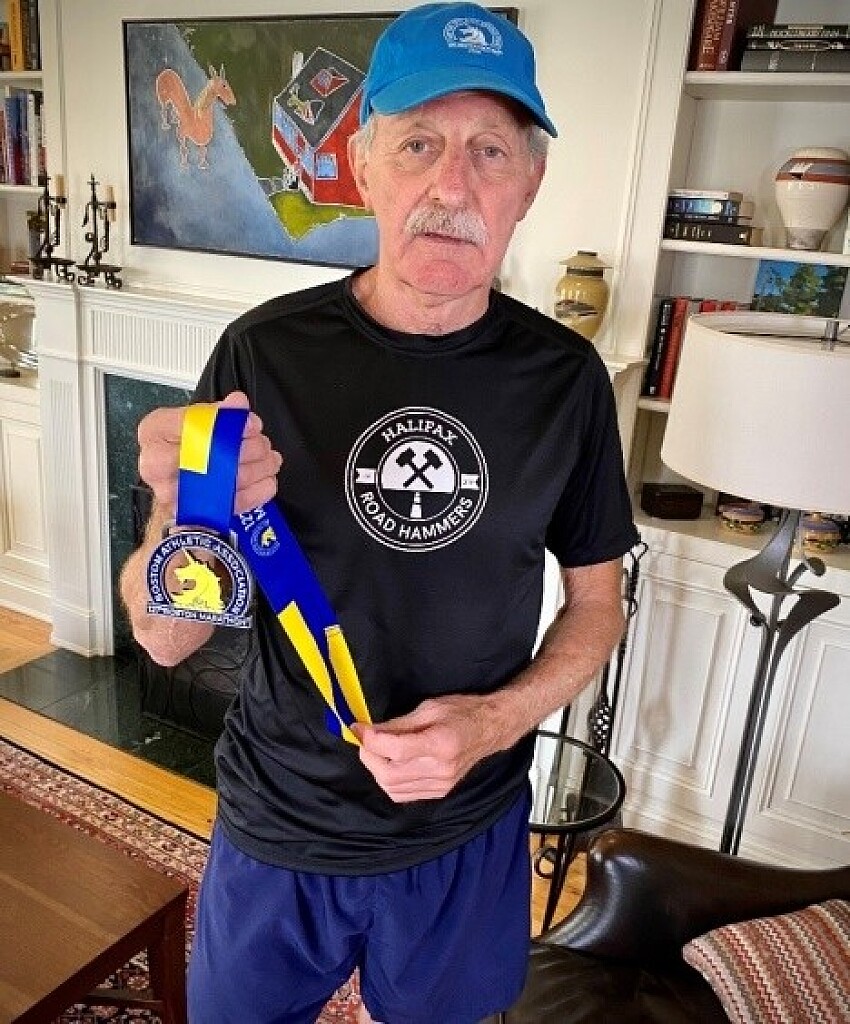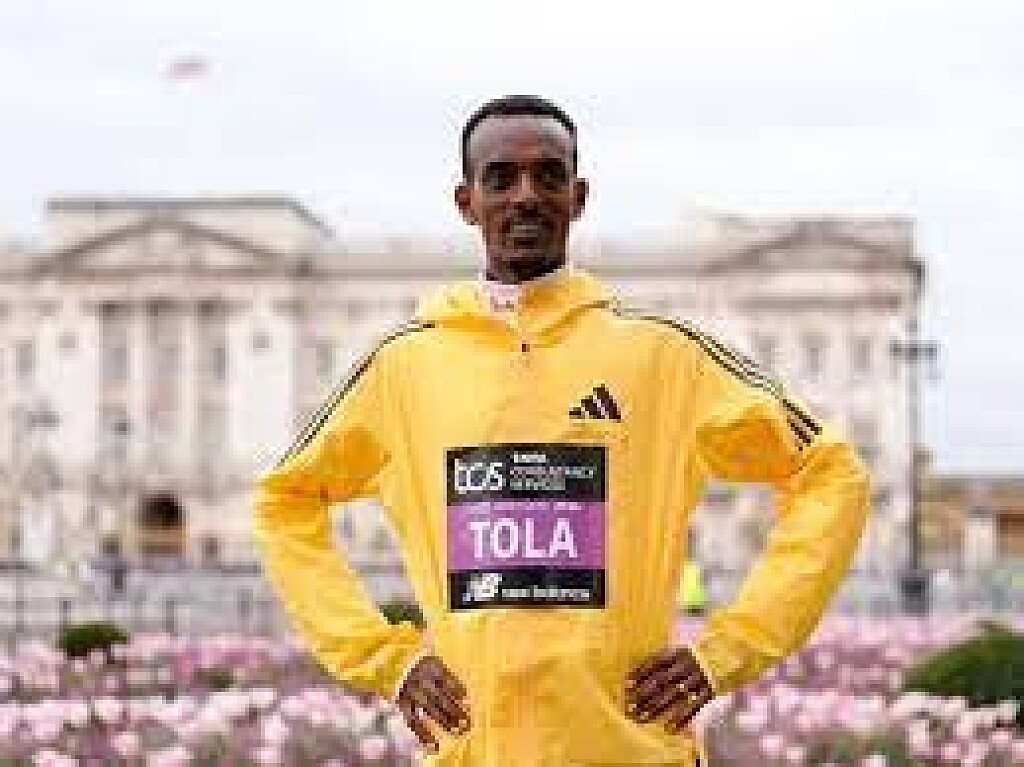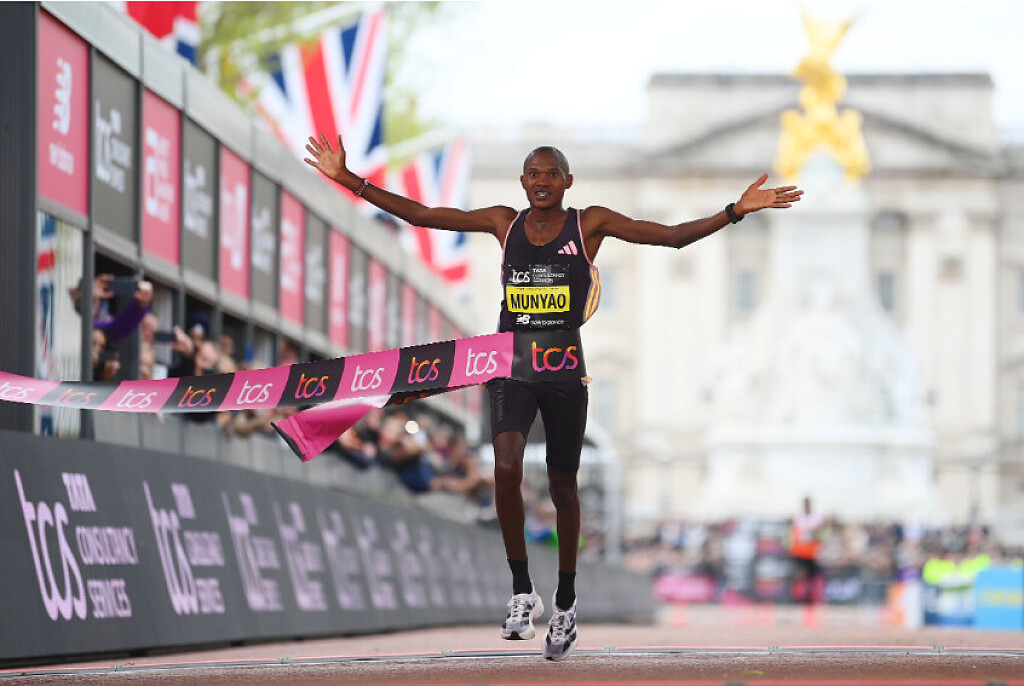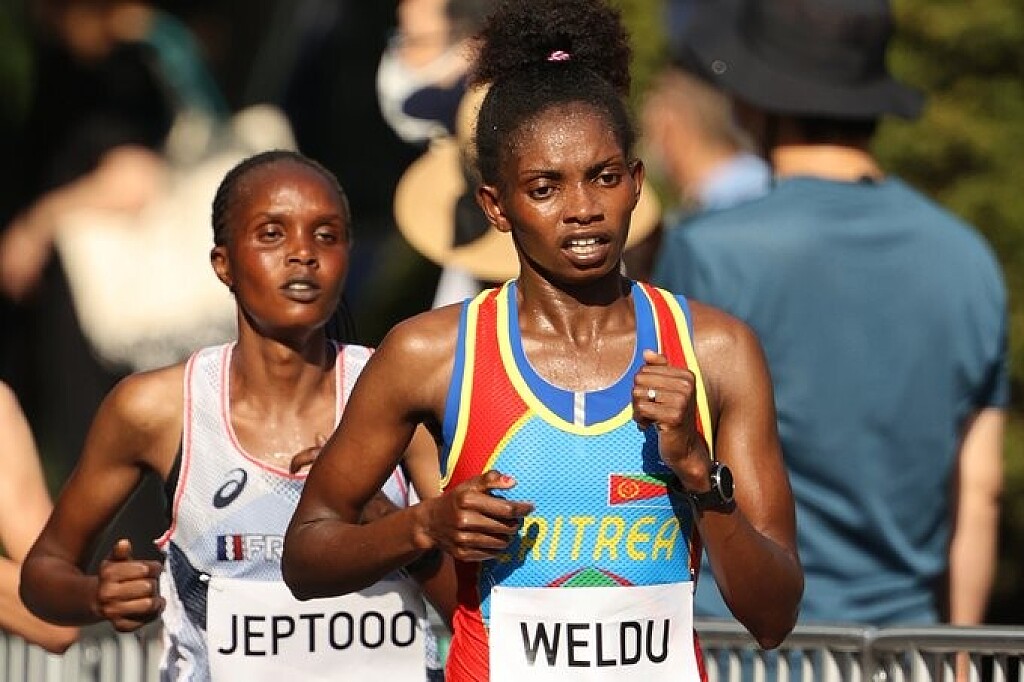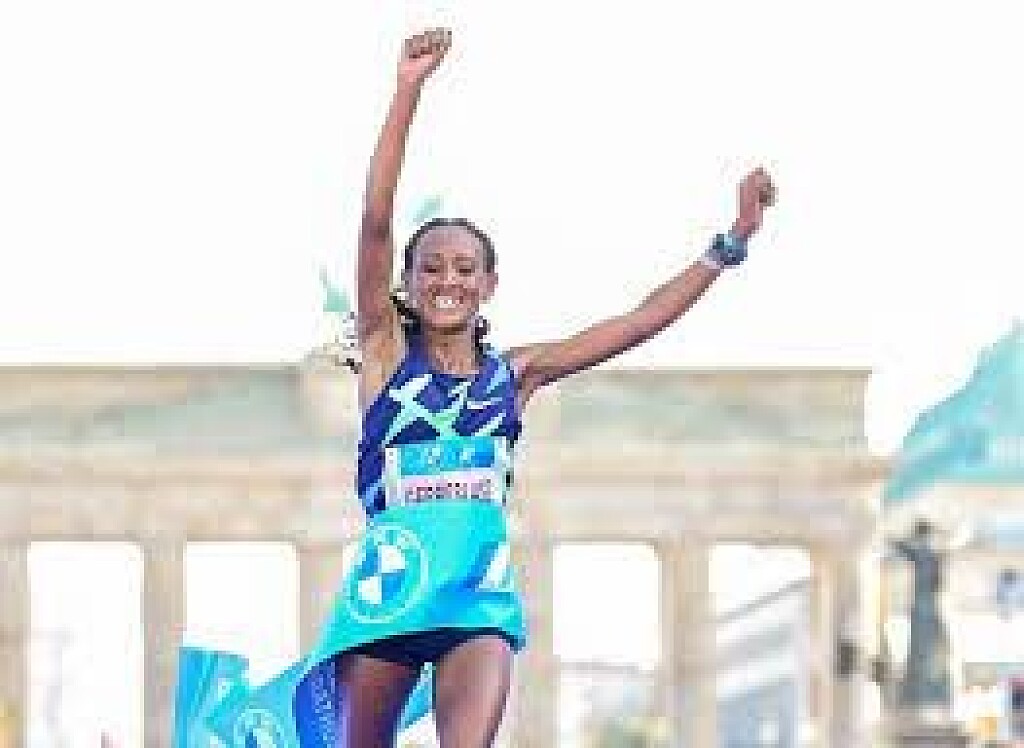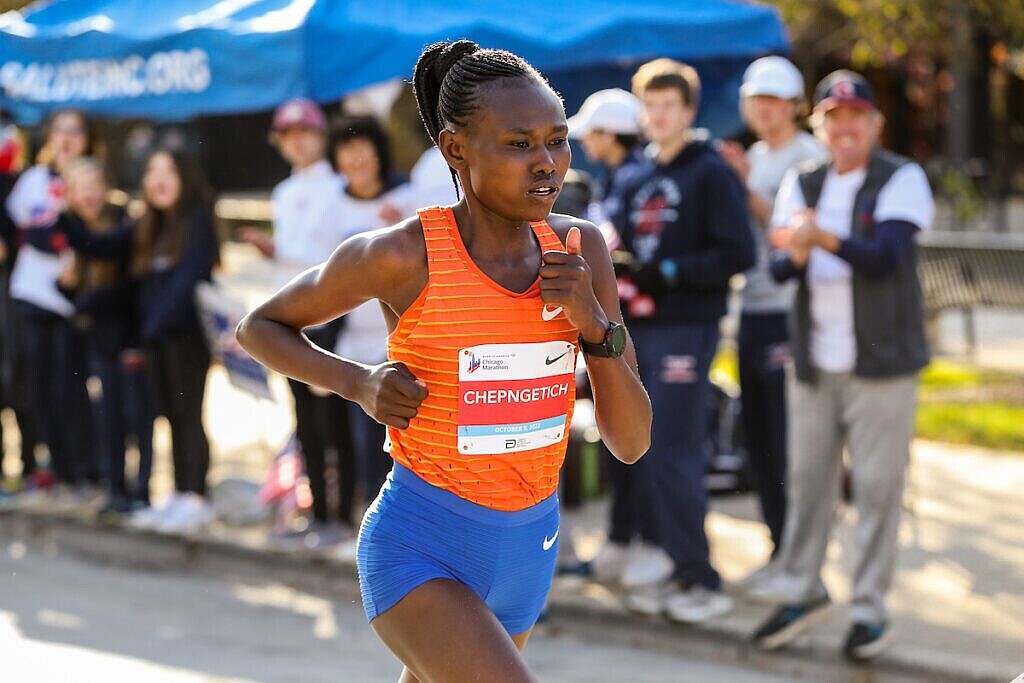Running News Daily
Top Ten Stories of the Week
4/27/2024
These are the top ten stories based on views over the last week.
Kenenisa Bekele honors Kelvin Kiptum ahead of London Marathon
Kenenisa Bekele has honored the late Kelvin Kiptum's legacy ahead of a poignant London Marathon, reflecting on his profound impact on running.
Ethiopia's Kenenisa Bekele has expressed profound sentiments as he prepares for the upcoming London Marathon set for Sunday.
The marathon will be marked this year by the absence of world record holder Kelvin Kiptum whose life tragically ended in a car accident in February.
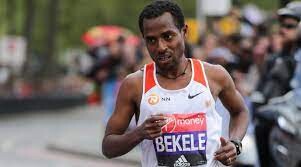
Kiptum, only 24 at the time of his death, had set a staggering course record at last year's London Marathon and had become a prominent figure in the sport.
Speaking to reporters, Bekele underscored the deep respect and admiration he and his fellow athletes hold for Kiptum.
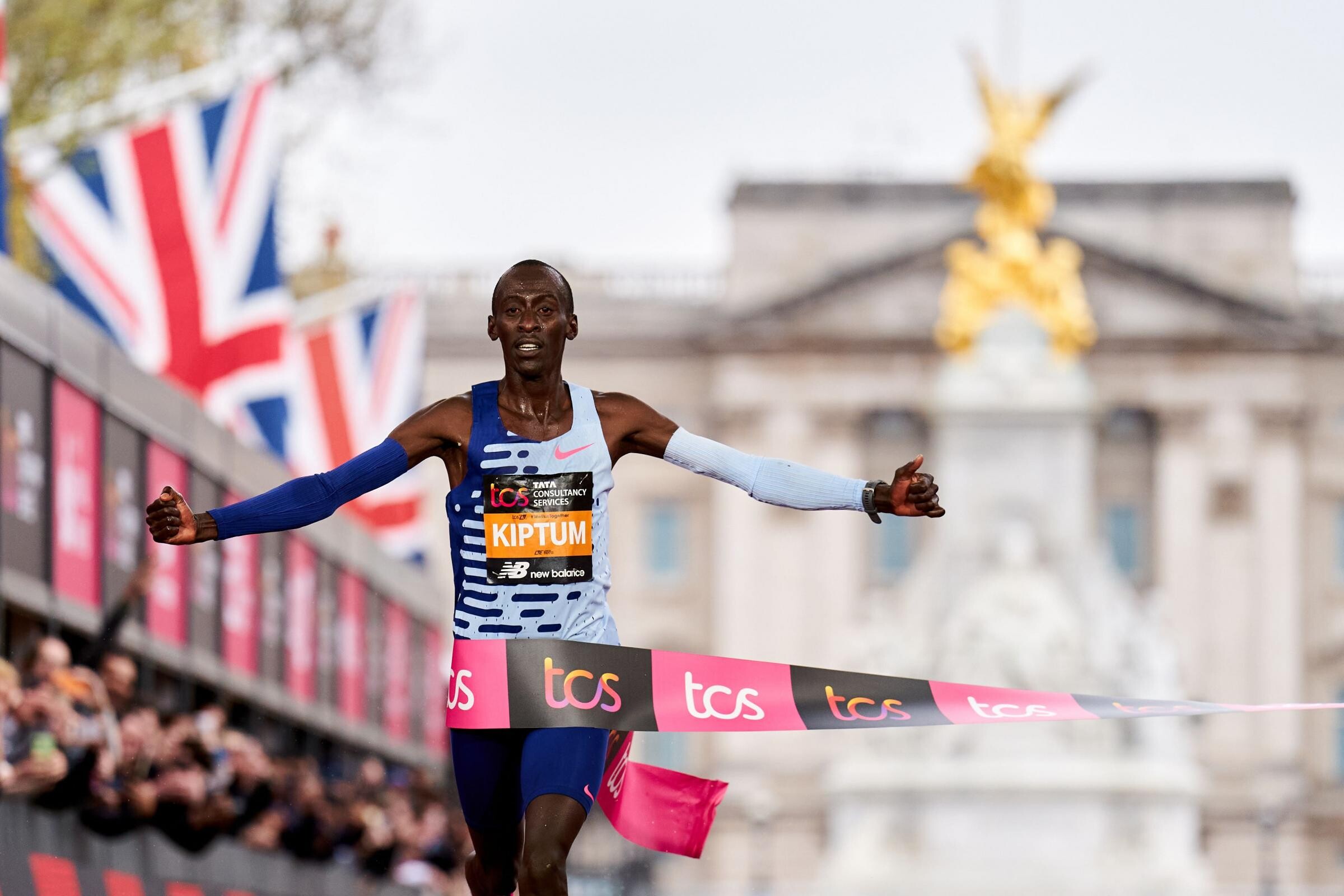
“Kelvin of course, all of us miss him. Even within his short time, he has been setting an amazing history,” Bekele reflected.
“The course record is also under his name and we are all remembering him."
Bekele added that Kiptum’s impact transcends his record-setting performances.
“We put him in a special place in our heart because in a really short time he has done a lot for our sport,” he said.
With the race ahead, Bekele is aware of the challenges in surpassing the benchmarks set by Kiptum.
The course in London demands a strategic approach, something Bekele is well accustomed to.
“Most of the time in London, maybe the first half is a very fast start because of pacing, but with me it can depend,” he explained.
Other top contenders, such as Ethiopia’s Tamirat Tola, the reigning New York Marathon champion, are also entering the race with high expectations.
Tola, optimistic about his preparation, remains focused on the present challenge.
“My training is OK and my body is okay, so we will see (what happens) on Sunday,” he noted.
Before the race starts, memory of Kiptum will be honored with 30 seconds of applause a moment meant to reflect on his contributions and celebrate his life.
(04/19/24) Views: 137Festus Chuma
Alexander Munyao Wins Men’s Race at the 2024 London Marathon
The 27-year-old broke away from Kenenisa Bekele, who finished second in a new masters world record.
For the second time in the past week, the men’s winner at a World Marathon Majors crossed the line in survival mode. Six days ago, it was Sisay Lemma holding on to win Boston. This morning, it was Alexander Munyao in London. The Kenyan survived a strong move in the 18th mile to win in 2:04:01.
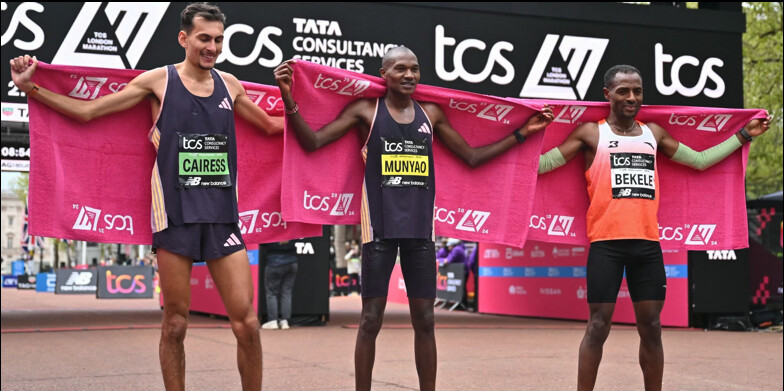
Kenenisa Bekele, arguably the greatest male distance runner in history, placed second in 2:04:15, four seconds faster than the masters world record he set in Valencia last December. The 41-year-old Ethiopian superstar was, surprisingly, largely responsible for the 4:35 18th mile that broke up what had been a nine-man pack.
By 35K (21.7 miles), the race was down to Munyao and Bekele. The two shared the lead more because of doing the best job of recovering after the earlier push than because they were speeding up. Munyao then got half a step on Bekele early in the 22nd mile, and broke him for good over the next mile.
Once they were dropped by Munyao and Bekele, the other earlier members of the lead pack that hit halfway in 61:29 suffered significantly. Tamirat Tola of Ethiopia, the 2022 world champion who broke the New York City course record last November, had looked eager to take over after the final pacer exited the course a little before 30K. Instead, Tola lost more than 20 seconds to the leaders before 35K, and dropped out before 40K.
The severe disintegration of the lead pack led to third and fourth place going to British runners who had been paced more moderately early on. Emile Cairess finished third in a personal best of 2:06:16 after being in 13th place at halfway (62:50). Mahamed Mahamed placed fourth in 2:07:05, also a personal best. Both men are now likely to be named to the British team for the Olympic Marathon, which will be held on August 10.
Munyao and Bekele were also running in part to secure spots on their Olympic teams. Munyao’s win, combined with his 2:03:13 PR and runner-up finish in Valencia in December, makes a good case. Bekele’s bid is even stronger. With Tola’s poor showing and Bekele’s second strong marathon in a row, will Ethiopian selectors recognize that a three-time Olympic and 19-time world champion deserves to toe the line in Paris?
Brian Shrader, the lone U.S. elite entrant, placed tenth in 2:10:50.
(04/21/24) Views: 134Canadian Boston Marathon age-grouper shares tips for running as we age
The Halifax runner took up running in his early 60s, and ran his fourth Boston Marathon on Monday.
Sandy Rutledge began running in his early 60s; he has run the Boston Marathon four times. The Nova Scotian clocked an impressive 3:31:38 at Monday’s 128th running of the famous race, earning him second place for his division and top Canadian in that age bracket.
“It was a slower than normal Boston, with the heat,” Rutledge told Canadian Running after his race. “I backed it off and went a little slower than last year, because I didn’t want to push it and not finish.”
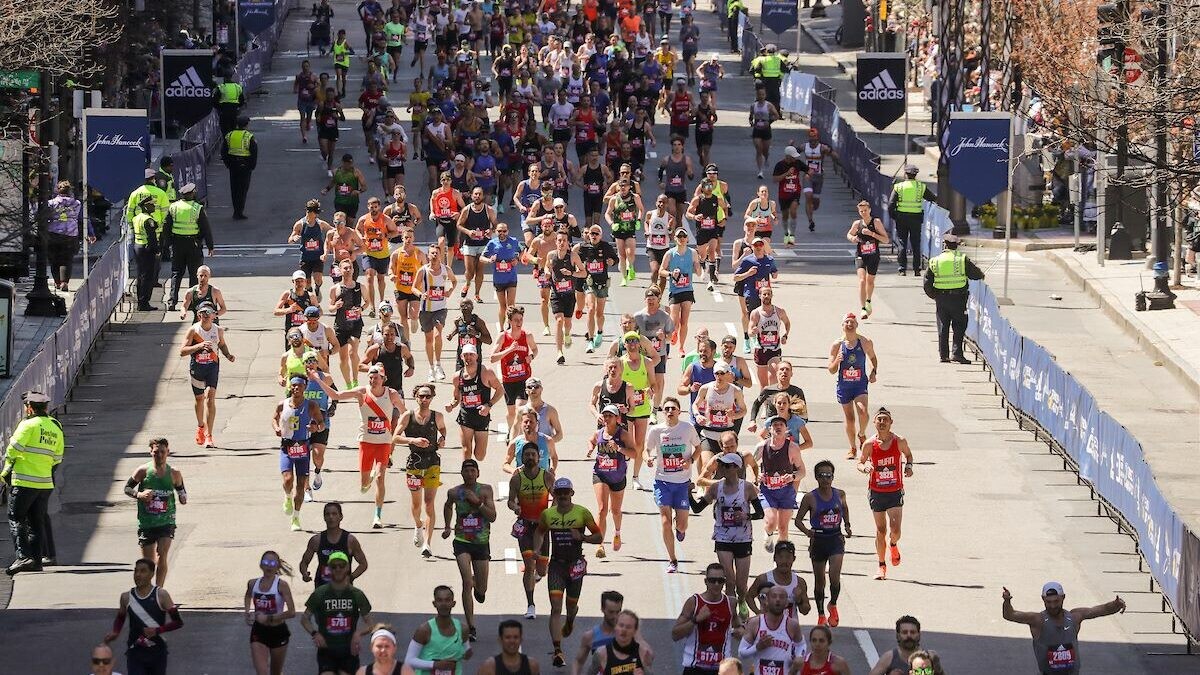
After a decade of running, Rutledge knows what he needs to do to stay competitive, but above all else, he’s looking at his longevity in the sport. “My goal is to run as long as I can,” he says. “In my 60s, I could run seven days a week and over 100 kilometres per week, but I’ve now backed that off to five days a week and lower volume,” he adds.
Rutledge has completed around 19 marathons and several shorter-distance races. And he has stayed relatively injury-free, thanks to a couple of key regimens that anchor his weekly training.
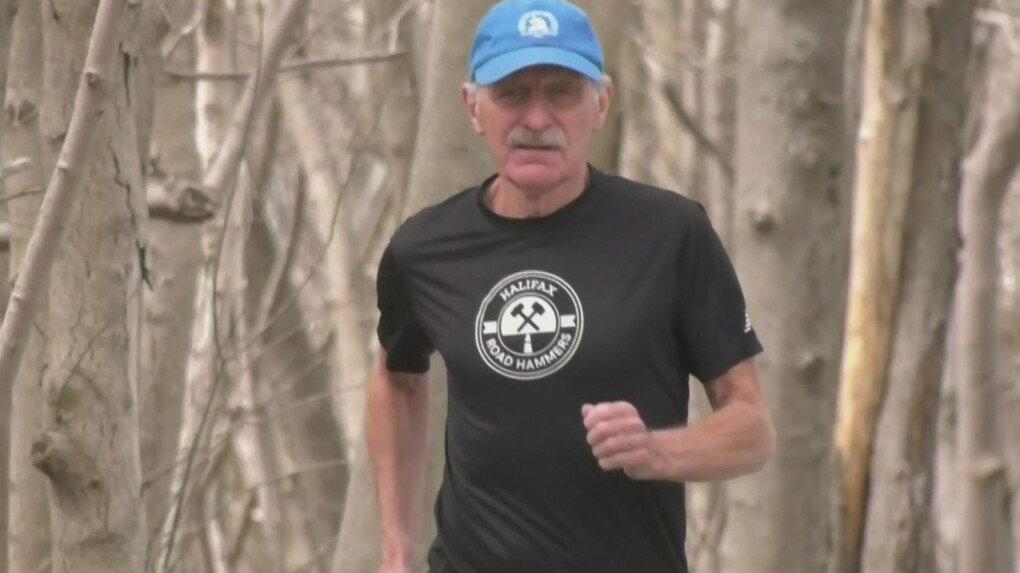
“I take Tuesdays entirely off running, and I do strength training,” he says, acknowledging that the consistency of these sessions has helped his healthy running streak. “I focus on the core in these… as we age, many people tend to develop back issues, and I’m no exception.”
Rutledge also shared that 20 to 30 minutes of daily stretching, often before his runs, has also played a big role in injury prevention.
As his career in real estate has wound down, Rutledge is grateful to running for helping him keep a daily routine, and a sense of purpose. “I wake up at 5 a.m.–I’m a morning person,” he says. “Running has brought me a sense of youth. I have continued doing most of the things I could do when I was younger, and I think running has done that for me.”
Having taken up running later in life than many other runners, Rutledge encourages anyone to give it a try if they’re curious, no matter their age. “I started really slow,” he says. “It began with walking and then adding in some running slowly… maybe a kilometre to start, and building up from there.”
Rutledge has no plans to slow down. “I’ve heard that most people have a 15-year life cycle in the marathon, and I’m 10 years in,” he says. “I’d like to keep running marathons into my 80s, but as long as I can keeping running five days a week, I’ll adjust the speed and the distances of my races, if I need to.”
Rutledge is looking forward to, hopefully, running the Athens Marathon later this year or next.
“That’s where it all began,” he says of the marathon. “I think we all owe it to the running gods to do that one at least once.”
(04/20/24) Views: 129Claire Haines
Tamirat Tola aims to follow New York success with victory in London Marathon
Tamirat Tola feels a carefully planned build-up will give him every chance of adding the London Marathon title to his success in New York.
The 32-year-old Ethiopian – world champion from 2022 in Oregon – clocked a new course record of two hours, four minutes and 58 seconds when he won in Manhattan during November last year.
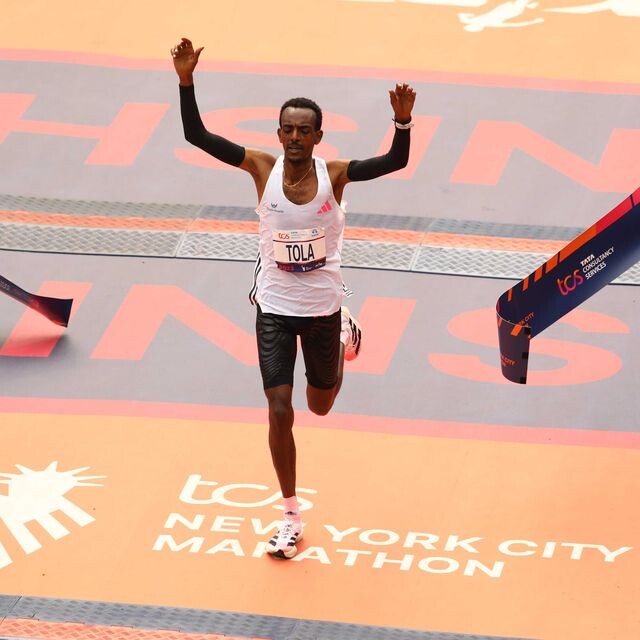
Tola hopes his meticulous preparations will allow him to again hit top form as he aims to be the first over the finish line on the Mall on Sunday afternoon, having come third last year.
Tamirat Tola of Ethiopia is the men's open-division winner, setting a course-record time of 2:04:58. #TCSNYCMarathon pic.twitter.com/VZRtRRrZxa
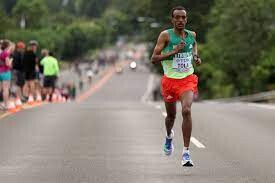
— TCS New York City Marathon (@nycmarathon) November 5, 2023
“(Winning in) London is not easy, but I worked hard to win New York and my training has all been OK since then, so I am ready,” said Tola, who also took the 2023 Great North Run title.
“Everything is good with what my coaches have prepared for me to win, so we can hope for a good result on Sunday.”
The late Kelvin Kiptum, who was killed in a car accident in February at the age of 24, set a new London Marathon record with victory last year.
While that mark of 2hrs 1min and 25secs is unlikely to be tested on Sunday, Tola is still confident of a swift pace.
“If we go together to help each other, then we will run with a better time,” Tola said.
“It depends on a pacemaker, but it is OK for me to go fast, and if it is a normal (pace) then that is also OK for me.”
Emile Cairess will lead Britain’s hopes in the elite men’s race, having finished sixth on his debut last year.
Cairess is aiming to better the Olympic qualifying mark to join training partner Phil Sesemann in the Team GB squad for Paris.
The 26-year-old, though, also has one eye on a long-term target of breaking Sir Mo Farah’s six-year-old British marathon record, which was set in Chicago.
“I have a time in my head. I will be trying to run maybe about three-minute kilometres,” Cairess said.
“Mo’s British record is something I definitely want to beat in the near future, but I am not looking at that this weekend.”
Scottish marathon record-holder Callum Hawkins will make his return in London following a number of injury setbacks, which included ankle surgery after the Tokyo Olympics.
Marc Scott, winner of the Great North Run in 2021, is set for a marathon debut, along with Mahamed Mahamed.
(04/20/24) Views: 127Kepchirchir breaks women-only world marathon record in London
Olympic champion Peres Jepchirchir smashed the women-only world record by 45 seconds at the TCS London Marathon, winning the World Athletics Platinum Label road race in 2:16:16* on Sunday (21).
In what was widely regarded as one of the deepest and highest-quality women’s fields ever assembled, the three-time world half marathon champion sprinted away from world record-holder Tigist Assefa, 2021 London winner Joyciline Jepkosgei and last year’s runner-up Megertu Alemu – all of whom finished inside 2:17 – to notch up her third victory in a World Marathon Majors race.
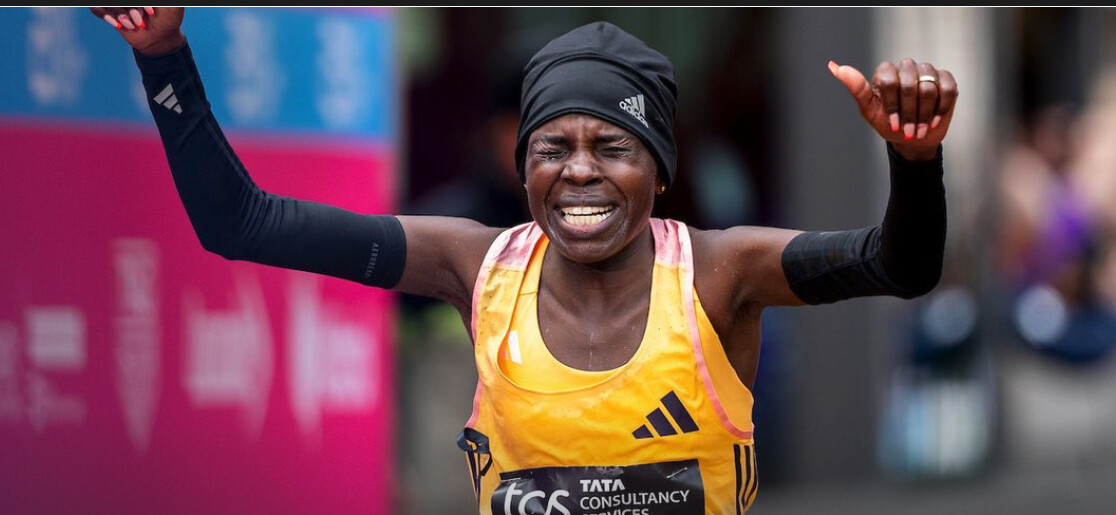
Jepchirchir’s compatriot Alexander Mutiso Munyao made it a Kenyan double, winning the men’s race in 2:04:01 to defeat Ethiopian distance legend Kenenisa Bekele by 14 seconds.
No secret had been made of the fact that breaking Mary Keitany’s women-only world record of 2:17:01 was the big target for the women’s race. With that at the forefront of their minds, a lead pack comprising all the big contenders soon detached themselves from the rest of the field and blazed through the first 5km in 15:44 – comfortably inside 2:13 pace.
They maintained that tempo through 10km, covered in 31:26, and at this point they were 67 seconds ahead of Ethiopia’s Tsige Haileslase, the closest challenger to the lead pack.
The front group – which included Assefa alongside past London winners Jepkosgei, Yalemzerf Yehualaw and Brigid Kosgei – got to 15km in 47:37. Soon after, Sheila Chepkirui – the runner-up in Berlin last year – started to drift off the pack.
Not long after passing the drinks station at the 20km point, 2019 world champion Ruth Chepngetich lost contact with the leaders. It meant that just seven women remained in the pack as they reached the half-way point in 1:07:04 – the second-fastest half-way split ever recorded in London, and putting them on schedule to smash the women-only world record by almost three minutes.
Kosgei was the next to drift back, and with the pacemakers having done their job, it left six women out in front: Jepchirchir, Assefa, training partner and Dubai marathon champion Tigist Ketema, 2022 London winner Yehualaw, 2021 London champion Jepkosgei, and 2023 London runner-up Megertu Alemu.
The sextet ran together through 25km (1:19:38) and 17 miles, but Ketema and Yehualaw were unable to hold on for much further and started to lose contact, leaving four women – Assefa, Jepchirchir, Jepkosgei and Alemu – to battle it out for the three podium places.
The difference between 25km and 30km, 16:18, was the slowest 5km section of the race. The lead quartet was either starting to feel the effects of their early efforts, or they were starting to bide their team for an anticipated surge in the closing stages.
With 1:44 on the clock, the four leading women managed to navigate their way around the two lead vehicles that had been forced to stop due to a wheelchair racer who was experiencing some technical difficulties.
Assefa and Jepchirchir both took turns testing the waters by making subtle surges to see how their opponents would respond, but their overall pace continued to drop and they reached 35km in 1:52:48, putting them on course for a 2:16 finish.They passed 40km in 2:09:13, still running side by side. It was clear that no one else other than these four would be claiming places on the podium, but predicting a winner – and, indeed, the athlete who’d miss out on the podium – was still impossible with less than two kilometres to go.
As the clock ticked to 2:15, with little more than a minute of running left, Alemu was finally dropped. Seconds later, Jepchirchir unleashed her trademark finish to leave behind Jepkosgei and Assefa.
The diminutive Kenyan charged through the finish line in 2:16:16, finishing seven seconds ahead of Assefa. Jepkosgei (2:16:24) and Alemu (2:16:34) followed soon after, making this the first marathon in which four women have finished inside 2:17.
Jepchirchir will now turn her attention to defending her Olympic title in Paris in less than four months’ time where she’ll aim to become the first ever back-to-back women’s marathon gold medallist in the history of the Games.
The men’s race played out in similar fashion with a surprisingly large group remaining together into the second half before the final few contenders were left to battle it out in the closing stages.The late Kelvin Kiptum’s world (2:00:35) and course (2:01:25) records were not being targeted by the elite men, but a lead pack of 12 nevertheless set off as a respectable pace, going through 5km in 14:35 and 10km in 29:03.
They remained together through 15km (58:20) with the likes of Munyao, Bekele, 2022 world champion Tamirat Tola and 2021 Chicago winner Seifu Tura all in the lead pack.
They reached half way in 1:01:29 with 10 men still running together, more than 80 seconds ahead of Britain’s Emile Cairess, who was running alone in 13th place. France’s Hassan Chahdi soon drifted off the lead pack, and eight men were in the pack at the 30km point (1:27:20).
With 1:30 on the clock, big changes started to happen. The lead pack was down to five men: Munyao, Bekele, Tola, Ethiopia’s Dawit Wolde and compatriot Milkesa Mengesha. Less than 10 minutes later, Tola and Wolde had dropped back, leaving Bekele, Munyao and Mengesha as the lead trio. Mengesha lasted five more minutes before he, too, succumbed to the pace, unable to stick with Munyao and the 41-year-old Bekele.
Just before the clock ticked over to 1:55, Munyao finally dropped multiple world and Olympic gold medallist Bekele, who was visibly struggling to match the Kenyan’s pace.
Munyao maintained his lead to the finish, eventually winning in 2:04:01 to Bekele’s 2:04:15, the fastest time ever by an athlete over the age of 40.
With several of the leading contenders dropping out in the closing stages, Cairess came through to take third place in 2:06:46 ahead of fellow Briton Mahamed Mahamed, who clocked 2:07:05, both setting huge PBs.
(04/21/24) Views: 127World Athletics
Eritrean runner Nazret Weldu wants to get to Paris via Vienna
Nazret Weldu intends to get to Paris via Vienna on Sunday. The Eritrean long distance runner is among a number of athletes who target a last minute qualification for the Olympic Games in August at the Vienna City Marathon.
Weldu is the favorite in the women’s race and could produce the first ever Eritrean victory in the history of Austria’s major road running event.

A total of over 42,000 runners have entered the 41st edition of the Vienna City Marathon. This is the third highest entry number of the event. For the first time since 2013 there are more than 10,000 marathon runners among them. The Vienna City Marathon is an Elite Label Road Race of World Athletics.
Nazret Weldu broke the national marathon record at the World Championships in Eugene in 2022 with 2:20:29. She placed fourth and missed the bronze medal by just eleven seconds. She was additionally unlucky since the qualifying period for the Olympic Games in Paris did not start until a few months later. Nazret Weldu ran two impressive marathons in 2023 as well, but somehow still did not achieve an Olympic qualifier. She was sixth in Boston with a fine 2:23:25. However this course is not record eligible, so World Athletics does not accept the Boston times for qualification. Next Nazret Weldu produced another very strong performance at the World Championships: In tremendous heat she finished eighth in Budapest – this time she was outside the 2:26:50 Olympic qualifying time with 2:27:23.
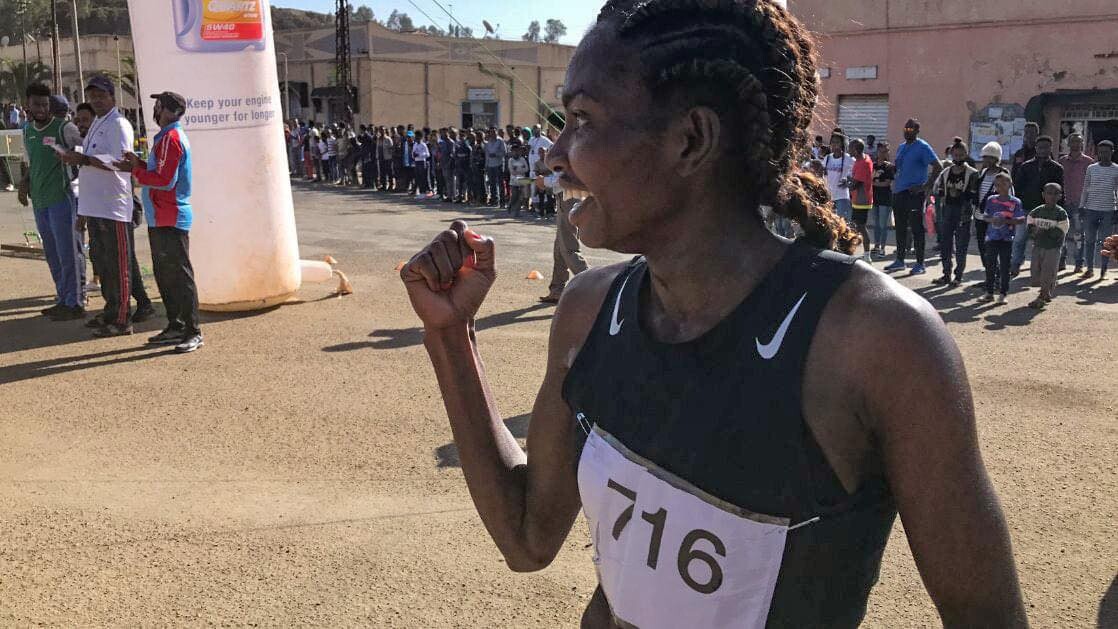
“I was fourth in the World Championships in 2022 and eighth in 2023 and still I am not qualified for the Olympic marathon this year in Paris,“ she said during Thursday’s press conference in Vienna. “But now I have the big chance to finally do it here in Vienna. My goal is to run a fast time on Sunday. I will see how it goes during the race. If there should be problems then I will make sure to run just fast enough to qualify for Paris,” explained Nazret Weldu, who trains in Ethiopia. “The reason for training in Addis is that I have a strong training group there.“ Among her training partners is Ethiopia’s 2022 World Champion Gotytom Gebreslase who was runner-up in Budapest last year.
While fellow Eritrean Dolshi Tesfu had to cancel her start in Vienna due to visa problems the strongest challenge for Nazret Weldu will probably come from two Kenyans: Shyline Torotich won the Enschede Marathon last year with a personal best of 2:22:45. The personal record of Rebecca Tanui is in a similar time range. She took the San Sebastian Marathon in 2022 with 2:23:09 and has the advantage of knowing the course in Vienna. A year ago she was fourth here with 2:26:34 when there were warm conditions.
“Last year I was unlucky since I was injured two weeks before the race. During training a motorcycle hit me from behind. This year I am fine,” said Rebecca Tanui. “For me the cooler conditions forecasted now are better than the warm weather we had last year. So I hope to run a PB on Sunday.“
Namibia’s Helalia Johannes is the fastest woman on the start list with a personal best of 2:19:52. The 43 year-old is not expected to join the first group which is likely to run roughly a 2:22 pace. However she will be among those runners who target the Olympic qualifying time of 2:26:50. Jovana de la Cruz Capani of Peru will probably join this group as well. To be among the three fastest runners of her country during the qualifying period she needs to improve her PB of 2:26:49 by just three seconds.
With a surprise improvement to 2:26:43 in Valencia last year Austria’s Julia Mayer has achieved the Olympic qualifying time. “I am ready to go on Sunday, it is a home game for me. I don’t expect to run a PB, but the goal is to achieve a very good place,“ said Mayer.
Kenyans Faith Chepkoech and Winny Kosgei are part of this year’s “OPEC Fund Rookie Team” in Vienna. They will both run their marathon debuts on Sunday.
(04/19/24) Views: 123AIMS
Three simple core exercises every runner should make time for
Every runner knows core strength is one of the foundations for success in their sport. From helping you to stay upright while running to protecting your spine, the benefits of a strong core extend beyond just helping prevent injury.
With a myriad of core workouts available on the web, it’s easy to get overwhelmed when deciding how to target this massive muscle group. We’ve compiled four simple, yet effective, workouts that you can fit in before or after your run in just a few extra minutes.

1.- Plank
There are many plank variations, and the beauty of this exercise is that it requires no equipment. High plank (arms extended) and low plank (on the forearms) are the simplest versions, but side plank allows you to target the smaller muscles in the core, such as the intercostals. Add in some movement like plank walk-ups, and you have several options to rotate into your routine, ensuring you don’t get bored. Increasing the duration of a plank hold is another way to make this increasingly more challenging as you progress.
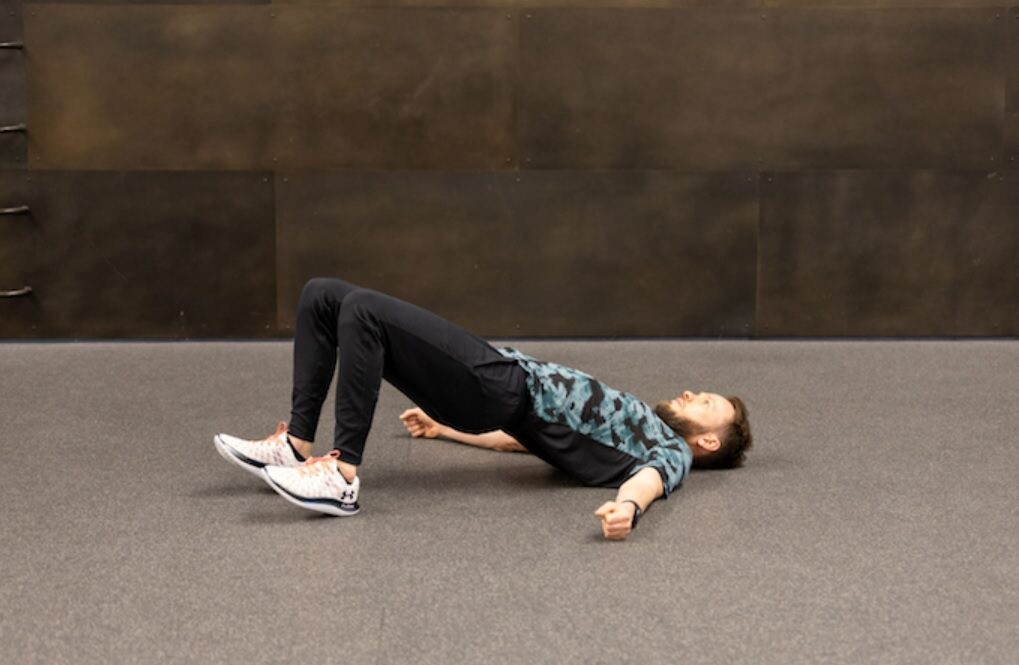
2.- Boat
Any runners familiar with yoga may recognize this one. Similar to the plank, boat pose can take several different variations that can increase or decrease its difficulty and target different areas of the core. You’ll feel a simple, still boat pose in your lower abdomen, but challenging yourself with some prayer twists brings the heat to the side abs, too. While in the posture, bring your hands to heart-centre and alternate touching one elbow on the ground at a time. Bicycle and simple crunches are another great option.
3.- Bridge
This one packs a lot of punch for how simple it is. In a successful bridge, runners will need to activate their glutes, another muscle group essential to injury prevention in running. As with the other two exercises, runners can keep this one simple or add single-leg movements to isolate the individual glutes and provide deeper strengthening.
Runners not currently doing extra core work will see the benefits with a few repetitions of these exercises weekly.
(04/19/24) Views: 122Claire Haines
Gotytom Gebreslase added to Hamburg field
Gotytom Gebreslase, the World Champion from Eugene 2022, has been added to the strong elite field of Sunday’s Haspa Marathon Hamburg.
The Ethiopian was runner-up at last year’s global championships in Budapest and has a personal best of 2:18:11. With this time she is the fastest woman ever entered into the Haspa Marathon Hamburg.
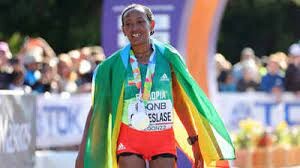
In the men’s race Bernard Koech returns to Hamburg as the defending champion. The Kenyan broke the course record last year with 2:04:09. Organisers expect to register a total of more than 35,000 runners for the 38th edition of the Haspa Marathon Hamburg. Over 14,000 of them are marathon runners.
“We have made a really strong development in recent years. In the past two editions there were three course records and world-class times. Now we have assembled another great field and it is quite possible that the course records come under threat once again,“ said the chief organiser of Germany’s biggest spring marathon, Frank Thaleiser.
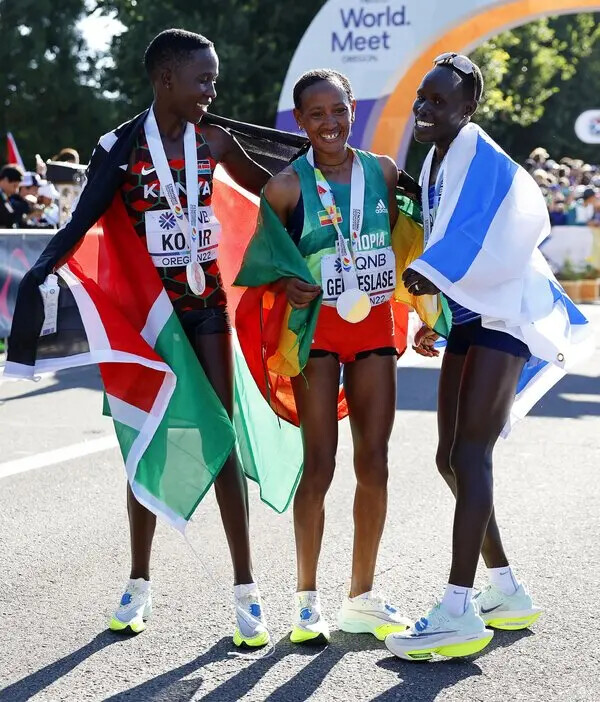
Gotytom Gebreslase, who sensationally won her marathon debut in Berlin in 2021, hopes to still qualify for the Olympic Games. However because of the extraordinary strong competition for the three places she would probably have to smash the course record of 2:17:23 set by fellow-Ethiopian Yalemzerf Yehualaw two years ago. Nine Ethiopian women have run sub 2:17:00 during the qualifying period, which was supposed to end on 30th April but has now been extended by World Athletics to 5th May.
Getaneh Molla heads an impressive men’s start list on which seven athletes have personal bests faster than 2:05:00. The Ethiopian ran his PB of 2:03:34 when winning an impressive marathon debut in Dubai in 2019. However he has not run as fast again since then. In contrast course record holder Bernard Koech has already run sub 2:05 on three occasions. While fellow Kenyan Samwel Mailu had to cancel his start because of an injury, a debutant could be in for a surprise: Former Kenyan Abraham Cheroben, who competes for Bahrain, has a world-class half marathon PB of 58:40.
(04/23/24) Views: 117AIMS
There’s No Such Thing as Too Much Post-Workout Protein
A new study blows up the conventional wisdom about maximum protein doses for athletes.
One of the key articles of faith of modern sports nutrition is that your body can only use a certain amount of protein at a time. Opinions differ on what that amount is. It might be as little as 20 grams; it might be as much as 40 grams, particularly for older adults whose bodies are less sensitive to the muscle-growth-stimulating effects of protein. Maybe it needs to be expressed relative to body size, like 0.4 grams per kilogram of body weight, rather than as a fixed number. Those details don’t matter here; the point is that there’s a maximum.

The reason that’s important is that most North Americans eat lots of protein, but don’t spread it evenly throughout the day. A typical pattern might be 10 to 15 grams at breakfast and lunch, then 65 grams or more at dinner. That means that at breakfast and lunch, you’re not getting enough protein to max out the synthesis of new muscle protein. At dinner, on the other hand, you’re getting too much, so the excess will simply be burned for energy. The better solution, according to this logic, is to smooth out your protein consumption so that you’re getting at least 20 grams (or 40 or 0.4 grams per kilogram or whatever) at each meal, adding a protein-rich snack sometime during the day, and perhaps even another one right before bed.
That’s the conventional wisdom. So a recent study in Cell Reports Medicine from researchers at Maastricht University in the Netherlands, led by noted muscle physiologist Luc van Loon (whose vivid, no-nonsense advice I’ve written about previously), has generated plenty of buzz. In short, van Loon’s new data suggests there’s no upper limit on protein after all, and that huge doses of protein—they use 100 grams in the study, because that’s about how much protein they figured they could eat at a barbecue without force-feeding themselves—produce proportionately larger increases in the formation of new muscle.
The study involved 36 volunteers split into three groups. They each did a one-hour weight-training workout and then immediately downed a drink containing either 0, 25, or 100 grams of protein. The protein came from the milk of a Holstein cow that the researchers injected with a special carbon isotope tracer. This meant that one of the amino acids in the milk had a slightly different chemical form than usual, enabling the researchers to track the progress of the protein drink as it was digested and incorporated into new muscle proteins in the subjects’ bodies. (I once interviewed one of van Loon’s postdocs about an earlier “glowing cow” experiment, and he described the unexpected responsibilities he had to take on: “My job was to talk to them, brush them, and basically keep them in a good mood,” he recalled. “If the animal becomes stressed, milk production declines, so we treated them like princesses.”)
Anyway, the next part of the experiment basically involved sitting around for 12 hours and taking a bunch of blood samples and muscle biopsies to figure out what was happening in the subjects’ muscles following the exercise-protein combo. That combination is important: both resistance exercise and eating protein boost the formation of new muscle protein, but putting them together within a window of four to six hours produces a muscle-building effect that’s greater than the sum of its parts. The full suite of measurements and analysis is extremely complex (and free to read about, if you’re interested), but the most important parameter is how much new muscle protein is being synthesized, because that’s what (more or less) dictates how much muscle you’ll gain over time.
There are two key things about the study. One is the time frame: most previous studies only monitored muscle protein synthesis for six hours or less, so 12 hours provides a much longer window for the effects of a big protein dose to show up. The second is the protein dose: previous studies topped out at 45 grams, so it may have been hard to see big differences compared to, say, 20 or 30 grams.
Here’s the key result, showing protein synthesis over the 12 hours following the workout and protein drink. Black circles are the 100-gram group; grey circles are the 25-gram group; and white circles are the 0-gram control group:
The effect isn’t subtle: the 100-gram group is getting way more protein synthesis than the 25-gram group right away. And the biggest difference comes after the six-hour (i.e. 360-minute) mark: by that point, the 25-gram group is back to baseline, while the 100-gram group still hasn’t gone back to baseline even after 12 hours. The extra protein synthesis isn’t exactly proportional—that is, four times more protein doesn’t give you four times the synthesis—but it’s substantial.
There’s a straightforward conclusion here, which is that the idea of a maximum protein dose—at least, one at 40 grams or less—was wrong. You always want to be cautious about chucking away a whole bunch of seemingly settled science on the basis of a single study. But this study seems solid, and it has identified some clear gaps—in duration and protein dose—in the earlier studies that it’s overturning. So let’s assume for now that it’s correct. The question, then, is what it means for how athletes should eat.
For practical purposes, the real apples-to-apples comparison would have been 100 grams of protein versus four doses of 25 grams spaced four hours apart. Which pattern would produce more protein synthesis in that comparison? Nobody knows at this point. There are a bunch of other reasons that I’ll be sticking with three meals a day, including the fact that I really enjoy all my meals. As an endurance athlete, I’m also as conscious of my carbohydrate supply as I am of protein. And even for protein and muscle-building, there are lots of unanswered questions—like whether you’d need to time your workout around your 100-gram protein bomb. If I lift weights in the morning then get all my protein in the evening, or vice-versa, does that still work?
There are certainly people who are into the one-meal-a-day thing, and for these people this is an important result. In their discussion, van Loon and his colleagues note that their findings suggest that time-restricted feeding shouldn’t necessarily lead to muscle loss. For me, the main takeaway is that it’s probably not as important as I once thought to spread my protein perfectly throughout the day. That won’t change how I actually eat, because getting 25 grams of protein at every single meal has always been more aspiration than reality—but at least I’ll feel less guilty about it
(04/20/24) Views: 115Outside Online
Ruth Chepngetich set to conquer 2024 London Marathon amidst elite competition
Ruth Chepngetich is targeting victory and a record at the London Marathon against a strong field as she eyes Olympic selection.
Two-time Chicago Marathon champion Ruth Chepng’etich is poised for a challenging race at the 2024 London Marathon this Sunday.
Chepng’etich, a formidable competitor who secured third place in the 2020 edition of the event, is aiming for a strong performance, although she has not discounted the possibility of setting a new record.
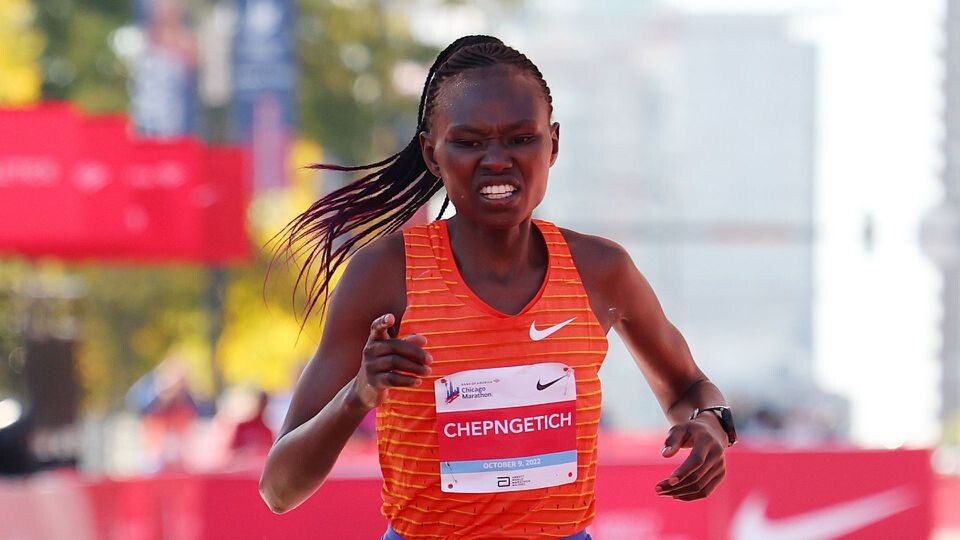
The pacemakers in the marathon will play a crucial role in maintaining the pace for the women's group, aiming to beat the women-only world record—a distinct possibility in London where the elite women compete in a separate event from the elite men and the larger mass of runners.
In a press conference ahead of the race, Chepng’etich expressed both enthusiasm and realism about her prospects against a competitive field.
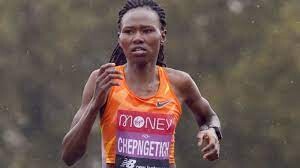
"I’m happy to be back after that race in 2020. I’m ready to run well, but the field is so strong," she stated.
Her main rivals include Ethiopia's Tigst Assefa, Kenya's Brigid Kosgei, Olympic champion Peres Jepchirchir, and Yalemzerf Yehualaw from Ethiopia, who won the London Marathon in 2022.
"Everybody here is chasing something. For me it’s about winning first, then I’ll think about setting records," she added.
The London Marathon has been a stage for numerous world records since its inception, with seven records broken to date, including Paula Radcliffe's unmatched 2:15:25 in 2003.
The marathon’s route, largely unaltered since 1981, takes runners through some of London’s most scenic landmarks, such as the Tower of London and the Houses of Parliament, starting from Greenwich Park and concluding on The Mall in front of Buckingham Palace.
Chepng’etich also touched upon her Olympic aspirations, noting the importance of the upcoming race for her selection to the Kenyan national team for the Paris Olympics.
"The Federation will make its selection after Sunday so we’ll see. But winning in London will be harder than in Paris," she noted.
(04/19/24) Views: 110Festus Chuma


